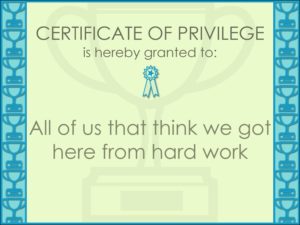Tag: privilege
Why is it so hard to admit our privilege and biases?
Why is it so hard to admit our privilege and biases?
Nobody enjoys being called out for doing or saying something problematic. But in the absence of having wrong behavior brought to our attention, why is it so difficult to consider the ways we’ve received advantages or participated in systems that limit opportunities for others?
I recently read several great articles on these topics, and what they all point out in different ways is that at the root of the issue is fear.
Chris Boeskool published a 2016 Huffpost article, “When You’re Accustomed to Privilege, Equality Feels Like Oppression” that sums up the fear of losing what we’re accustomed to.
On the flip side, what is there to gain by admitting advantages – or lack of disadvantages – that we’ve experienced in our jobs, in our access to housing, and in our daily activities like shopping or exercising?
We might gain a new perspective and empathy for the ways that people can have different experiences than us. It might lead us to examine the way we treat coworkers, customers, or people we pass in the grocery store. Maybe, even if we think we’re already doing fine, it will lead us to do better.
“Do the best you can until you know better. Then when you know better, do better.” – Maya Angelou
We Didn’t Get Here From Hard Work Alone
 It’s easy to attribute hard work to any kind of career success we have.
It’s easy to attribute hard work to any kind of career success we have.
“I worked hard in high school; that’s why I got into this prestigious university.”
“I worked hard in college; that’s why I was hired at this great job.”
“I worked hard on this project; that’s why I got a promotion.”
OK, so we did our homework and studied for tests. We carefully completed the applications and were scrupulous with our resumes. We figured out what our managers wanted and delivered it.
It was hard work.
But.
That hard work is often the effort used to capitalize on our fortunate circumstances. We can convince ourselves that we deserve our success, that we earned it, because we put a lot of time and focus into achieving it.
Hard work is honorable. Working towards a career goal is admirable.
Yet.
Hard work alone did not earn us our achievements.
Someone read and accepted our college application. Someone permitted us to interview for the job and someone made the decision to hire us. Someone favored us with the promotion or raise or award.
Someone decided we were qualified, acceptable, and perhaps more worthy than others aspiring to the same position.
Because they are human, those someones have their own ways of evaluating us. Their experiences and their environment influence their perspectives. They may be aware of their ingrained biases and work to overcome them. Or they may unaware of unconscious biases, or disbelieve that they exist.
Unconscious bias does exist.
Overt bias also exists in plenty of people who believe certain people are inferior, threatening, or sinful.
If we are a combination of any of these factors, we have benefited from other people’s biases regardless of whether it was intentional:
· White
· Heterosexual and cis
· Male
· Tall (unless you’re a jockey)
· Body and face considered normal and attractive by societal standards
· Attended decent primary and secondary schools
· Wealthy parents
If we have some of these characteristics – and I do – we have benefited from them.
If we don’t admit our undeserved advantages, we get to believe we earned our slot by working hard. We also get to believe that other people should work harder if they want what we have and it’s their own fault if they don’t. We can then support this line of thinking by pointing to people who achieved great success despite the odds.
It’s very American to hail the underdog achievers and the rags-to-riches stories. However, these examples stand out precisely because they are not the norm.
When we’re surrounded by other privileged people and the exceptional outliers, it’s easy to assume everyone else’s lack of success is due to a lack of effort. We might even believe that if our advantages had been stripped away, we would still be accomplished.
Believing it doesn’t mean it’s true.
I acknowledge my privilege and the role it plays in my education and career opportunities.

Recent Comments